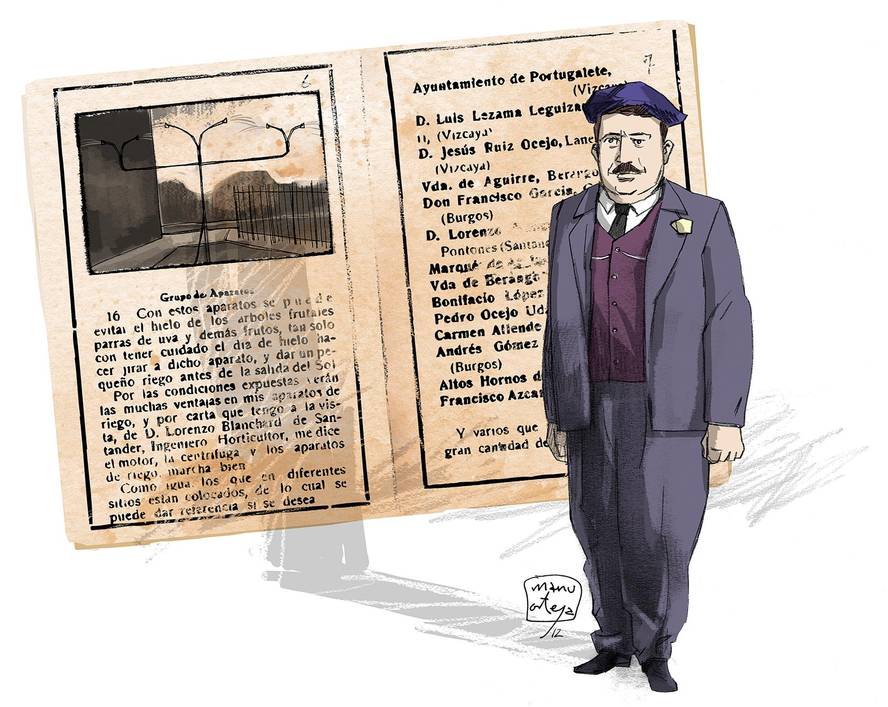Julio Ortiz de Barrón
Ane Miren Ortiz de Barrón is noted to admire her grandfather Julio. So he came to Elhuyar to tell the story of his grandfather. According to his grandson, grandfather Julio was a kind and kind man, but not only that, he was very clear and a born inventor. Among others, he invented and patented one of those rotating irrigation systems that today we are used to seeing in gardens and orchards. "It made sense inventor, it had invented things of its own, it had not learned anywhere," says Ane Miren.
The truth is that Ane Miren did not spend much time with his grandfather, since after the battalion of Avellaneda in the war his father had to emigrate to Venezuela with his wife and two daughters. Ane Miren was born in Caracas. "Every year we came to Bilbao to grandparents," recalls Ane Miren. Until his grandfather got sick: "Then my mother decided, because she loved her father-in-law so much, that we were going to live in Bilbao. Then the grandparents lived in the street of Licenciado Poza and we spent a year with grandfather until he died."
Julio Ortiz de Barrón, born in Alava, was born in Barrón in 1878 and spent his childhood in Fresneda. His father had vineyards there, winemaking craft. "My grandfather said that as a child he was going with a donkey to sell wine. And when he gets bored, he would drunk the donkey." Ane Miren wants to show that her grandfather had a very simple life and that he had no studies or special education.
As a young man he moved to live in Bilbao. She settles into a pension and falls in love with the sister of the owner of the accommodation, Julia Araluce. They married in 1902.
He knew some mechanics and thanks to this he began working as a driver in Udalla (Cantabria) for the owners of an anise factory there, for Ocejos. And after several years of life in the City Hall, they went to Getxo, to Las Arenas. A store was installed under the house. They made life in that tent, they also had the kitchen, and only went up to sleep.
Later Ortiz de Barrón took the business of the beach huts. They were huts for two or four people, painted white and green. "As his uncle José Luis said they were very pretty," says Ane Miren. They had terraces with awnings and a wooden coat rack on the shore, where women used white plush bathrobes to go to the shore, where they were waiting for them.
On a tragic night all the cabins were burned. It was a hard blow to the family, a great loss. They sold the store and moved to the neighborhood of Itzubaltzeta. Together with them they had a gentleman, José Luis had "spectacular and well fed horses", used by the rich of Neguri to play polo on the Lamiako pitches.
At that time approximately Ortiz de Barrón made his greatest invention: the rotating irrigation. "Rotating appliance for irrigation of gardens and orchards" on the cover of the patent brochure. Inside come the explanations. "It can produce an intense or fine rain effect, depending on the plant you want to water," says the first point. Later, it highlights the advantage of being portable, because thanks to it several fields of cultivation could be founded with a single device. And according to the water pressure he also explained that he watered so much circumference: "Circumference of 26 meters in Bilbao; 30 meters in Las Arenas; 28 meters in Santander; 30 meters in Madrid, Retiro". "This device can take a spin per minute or up to four hundred with adjusted wings," says a few lines below. And "it's so simple that the device is available to anyone who wants to water."
It seems that this invention was well received. They won prizes and began to settle in a thousand places. But the war came and the family situation of the Ortiz worsened. "Julio could not cope with the investment in manufacturing the invention, advertising, French and Spanish patents, etc. says Ane Miren, "and in the end he could not renew his patents." There ended the connection between the sprayers so common today and Julio Ortiz de Barrón.
The family keeps the information leaflet of this patent in the form of a treasure. And they also keep their grandfather's memories. But grandfather Julio has left in the family more than a good memory, according to Ane Miren. "That gift was inherited by his children. I remember my father fixing all the clocks, and the TV knew how to fix everything that broke and he didn't learn mechanics or anything like that, he was an economist. And I have a nephew who fixes everything that breaks at home since I was very young."
So was grandfather Julio, who invented a cigarette machine at home, "they say it was small, very fast and very easy to use," says Ane Miren. Or "to my mother, to her daughter-in-law, she made the electric stove to be able to heat my sister's bottle, so I don't have to light the coal kitchen."
Her mother tells Ane Miren that her grandfather had a passion for her grandchildren. The two older sisters of Ane Miren, born in Bilbao, took them every day to the park and then to the bar, to eat olives, because they were good for hunger. Now grandchildren also speak with love of their grandfather. You can see that they admire their grandfather Julio.






